Crossing Divides: Housing issues facing Scotland's traveller communities
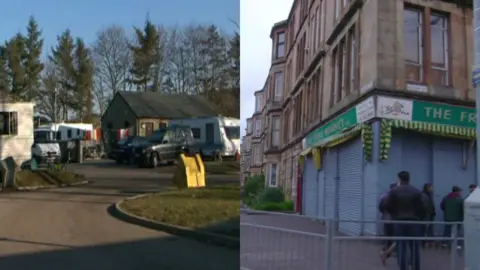 BBC
BBCThe term "traveller" encompasses different identities from across the world, but is often used homogenously.
Travelling, in a nomadic sense, is an important part of the ethnic and cultural identity of Scotland's travelling communities - but they are not always literally "on the road".
However, for those who choose to live in settled housing within a community, the standard of accommodation available often comes up short.
More than one in three of sites for Scottish Gypsy travellers are still failing to meet minimum standards despite prior warning from the housing regulator in Scotland.
Meanwhile, in Glasgow's Govanhill area, the local housing association has stepped in to improve properties. An initiative which has benefitted the local Roma traveller community.

Roma travellers in Glasgow
Samuel moved from Romania to Glasgow's Govanhill in 2016 - areas of which are ranked amongst the most deprived in the country. He travels to Stirling each day for work.
He says that he is "very proud" to be Roma and that, had there been better opportunities, he would not have left Romania.
"I miss Romania, but I know I couldn't get work there and give my children a good life."
The family have recently secured a home through a local housing association, but their first flat in Glasgow was a private let.
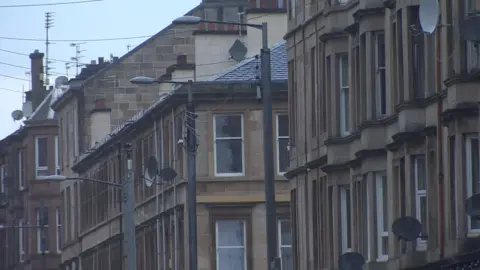
"The former house that I was living in didn't have the same conditions this house has, it was a lot smaller," Samuel said.
"We were sharing one bedroom and one living room between the four of us. Here we have two bedrooms and a lot more space in general.
"The boiler would often break which meant we couldn't use the shower. If we phoned the landlord it would take sometimes up to a week for them to fix the issue."
Samuel's family now live in a a reasonably priced and well maintained flat - renovated through a scheme operated by the Govanhill Housing Association.

Govanhill Acquisition Programme
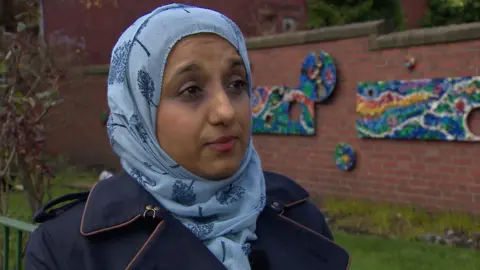
Govanhill councillor Soryia Siddique said her caseload is overwhelmed with issues linked to poor housing - like overcrowding, infestation and cleansing.
"When you knock a door, you will see so many shoes. There are large numbers of people living in one and two bedroom flats," she said.
"Some of the overcrowding is related to poverty, some of it is related to people not knowing their rights as well in terms of tenancies."
"A multi-million programme was put forward - the Govanhill Acquisition Programme," she said.
"Private lets and landlords were told - you have to bring your property up to a housing tolerable standard
"If it's not, the local housing association will acquire that flat and bring it into social letting."
There have been some reported tensions in Govanhill between Roma travellers and some sections of the community who are longer established.
"There are challenges in the area and we recognise that, but to stigmatise a community is unacceptable," said Ms Siddique.

Conditions at sites for Scottish travellers
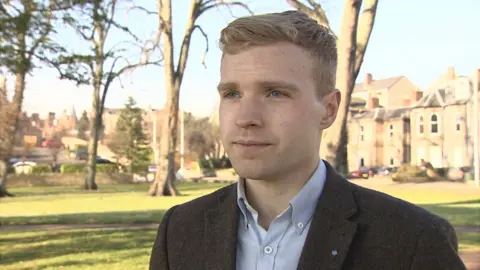
While in Govanhill there have been some positive outcomes for Roma travellers in relation to housing, this stands in opposition to the experiences of many Scottish travellers.
It is the legal responsibility of councils to provide permanent sites for Scottish travellers with pitches for rent plus facilities for washing.
Davie Donaldson campaigns for better conditions and rights for Scotland's traveller community.
"In some cases the people living on the sites have described them as sub-human," he said.
"We've had people from the community giving evidence in reports for years now.
"The government are very good at doing reports, but they're not very good at putting their hands in their pockets when it comes to fixing the issues."
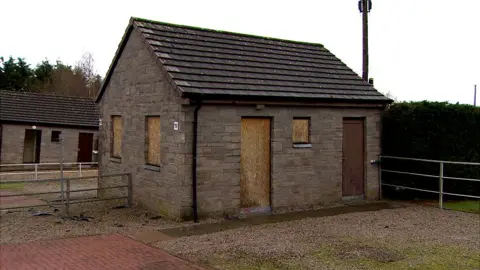
Mr Donaldson says the time has come to look at funding streams and ensure that money was spent on the sites.
"There hasn't been a new site built in my lifetime," he said.
"We have an accommodation crisis across the country. We have just short of 500 pitches for a population estimated to be 60,000.
"If this was settled community housing, there would be national outrage."

A warning for local authorities
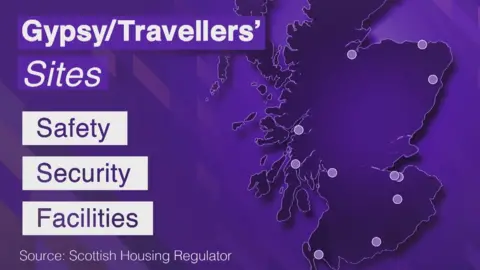
The Scottish Housing Regulator (SHR) warned local authorities last October they must get the sites up to scratch or face formal intervention.
Eleven out of 27 mainly council-run sites have yet to improve on areas such as safety, facilities and security.
SHR said travellers had a "fundamental right to live in safe and secure homes, in communities where their cultures and traditions are respected".
"It's a huge concern to SHR that all sites did not meet the site standards by the deadline of June 2018," a statement added.

Dumfries and Galloway
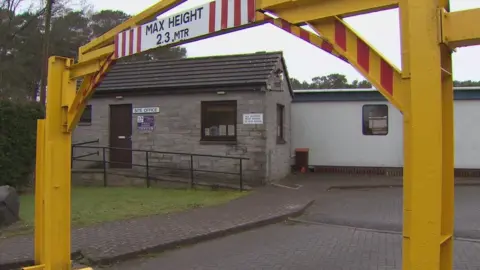
Dumfries and Galloway Council is the worst offender in the whole of the country with its Collin site falling short on seven out of eight of the standards set by SHR.
Subsidence is the big problem there with some of the buildings visibly slanting - one had to be condemned it was so bad.
The site was built on a peat bog and the council has been told it could cost nearly £8m pounds to fix.
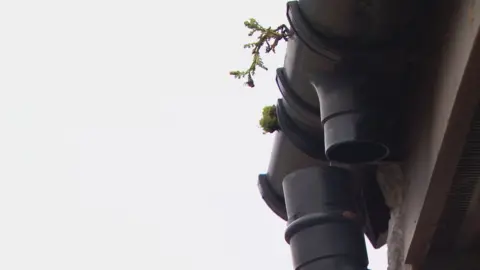
Andy Ferguson, who chairs the council's communities committee, told the BBC he was "embarrassed" but steps were being taken to improve things.
"This didn't happen yesterday, some of this stuff has been happening for a number of years and we're having to now fix it.
"And that's the positive thing - we're actually taking positive steps now to actually do something about this."
The committee has asked officials to look at "all options" for the site.

'The right to a safe and secure place to stay'
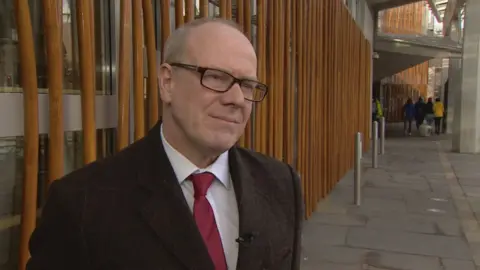
Housing Minister Kevin Stewart said councils did have funding at their disposal to deal with housing issues relating to sites for Scottish travellers.
"Each local authority, within its capital budget from central government, has an element that was set aside previously for Gypsy/Traveller sites," he said.
"It would be unfair if those authorities that have failed to meet the minimum standards expected government to pay for the works to be carried out.
"Others have managed to do it within the budgets that they have had allocated. There are no excuses here."
Cosla - which represents Scotland's councils - said it understood the majority of local authorities, which had not met the required standards, were taking steps to address problems.
Elena Whitham, spokeswoman for community wellbeing, said they were committed to protecting and promoting the rights of travellers.
"Everyone living in our communities has the right to a safe and secure place to stay.
"That is why Cosla and our member councils are determined to support better accommodation and experiences for Gypsy/Traveller communities," she said.

BBC Crossing Divides

A season of stories about bringing people together in a fragmented world.
